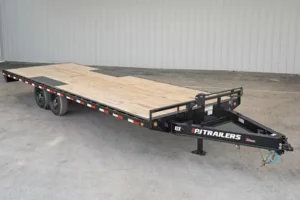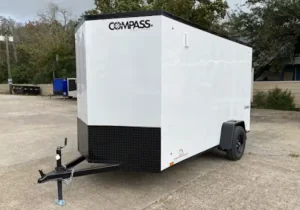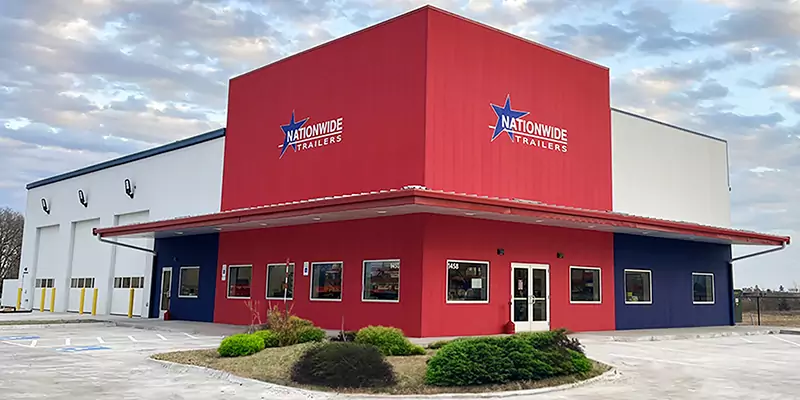Investing in more trailers seems like the obvious choice when you’re looking to expand your operation. The right equipment makes your turnaround times quicker and your work even more thorough. While renting might be the option you think of first, you shouldn’t count out renting to own. What does it mean to rent to own? What are the benefits of renting to own? This alternative purchase option might not be on your radar, but it’s worth exploring. Learn more about renting to own and how it differs from just renting below.
What Is Renting to Own?
Basically, renting to own is somewhere halfway between renting and buying. The rent-to-own process involves you and the seller agreeing on the amount you’re going to pay, which you pay over time until you own the equipment. If you can’t pay the monthly amount for any reason, you return the equipment to its owner — no harm, no foul. This choice doesn’t require a credit check, and your business gets to benefit from new equipment without having to fork over too much money upfront, which is required in the traditional buying process. In some situations, renting to own can be a happy medium that benefits both parties.
What Is Traditional Renting?
The traditional renting option is perfect if you want to use something but don’t want to buy it. Once you and the owner decide on the daily, weekly or monthly fee you’re going to pay and sign a contract, you’re good to go. Then, you use the equipment for as long as agreed upon before returning it. Think of it as renting a house or a car. While renting works when you need a certain trailer for one job, you might consider renting to own when you plan to use that trailer for years to come. In that case, you might as well have one of your own, and renting to own gives you flexible payment terms that could work better for your business. This option could also be less expensive than buying something in full right off the bat.
What Is the Difference Between a Rent-to-Own Agreement and a Rental Agreement?
Apart from the obvious — renting isn’t owning — you’ll note some other differences between the two. Let’s do a quick comparison to help you fully understand the scope of each scenario. Typically, rent-to-own agreements include the following components:
- It’s a more long-term situation: Because you’ll pay for the equipment over time, you’ll find that rent-to-own situations are more long-term than buying arrangements.
- You’re responsible for repairs and maintenance: Aside from mechanical defects direct from the manufacturer, you use the trailer as if it’s your own, which means you’re solely responsible for the trailer repairs and maintenance.
- There’s a contract: This contract generally covers the basics like the terms and payment amounts. It’ll also outline the requirements for buying the equipment at the end of your agreement.
In comparison, renting involves:
- It’s a short-term scenario: Usually, renting is only for a specific project or time period. When that project or time ends, you return the equipment to the owner in the condition you rented it in.
- The owner is responsible for repairs and maintenance: Unless you damage the trailer in the course of your work, the owner is responsible for paying for regular repairs and maintenance.
- There’s a contract: This agreement covers rental amounts and who’s responsible for what during the allotted time.
Is Renting to Own a New Concept?
No, renting to own is a concept many people have relied on to purchase items and properties for decades. For example, some people rent homes, and if the owner decides to sell the house to the tenants, the owner will put the amount they’ve paid in rent toward the price. This option isn’t prevalent for things like equipment sales, but it’s becoming more common as companies try to provide more purchasing options for their customers.
Why Rent to Own Over Renting?
The biggest advantage of renting to own is that it provides people with a flexible third option that leads to ownership. With the rent-to-own option, you can slowly make your way toward owning a trailer, which might not otherwise be possible depending on your situation. This arrangement is flexible and accommodating, and you end up with a piece of equipment that can help you expand your business. Other benefits of renting-to-own include:
- Add assets to your business: Though renting allows you to use the tools you need, you’re spending money without investing in permanent assets for your company. Comparatively, renting to own gives you the option to add concrete value to your business.
- Improve your credit rating: If you make your payments on time, you could boost your credit score.
- Buy without the hassle: Going through the process of a credit check might not be what you want right now. When you rent to buy, you only need to agree to terms with the seller.
- Enjoy lower payments: This option might actually work out to be more economical in the long run. Since rental prices add up over time, the low repayment rates of a rent-to-buy option could be a win-win.
- Keep your debt ratio low: The rent-to-own option is great for those wanting to keep their debt-to-income ratio low. Increasing or maintaining the buying power allows the buyer to become more flexible with cash on hand.
Rent to Own vs. Traditional Financing
When you’re looking at different methods to purchase a trailer for your business, comparing options is part of the process. Some key differences between renting to own and traditional financing include:
- Transfer of ownership: When you’re using financing, the seller transfers ownership to you at the beginning of the contract. In a rent-to-own situation, the trailer will be yours at the end of the contract.
- Risk potential: Because you don’t own the trailer until the end of the contract when renting to own, you can’t sell it until then. If you can’t meet the terms of the agreement, ownership remains with the seller.
- Repairs: For the duration of a rent-to-own agreement, you remain the renter. Just like with a house, the owner is responsible for the repairs unless you accidentally damage the trailer during your work. This means renting to own typically doesn’t require worrying about maintenance on your end until you fully own the equipment.
Deciding to rent to own is ideal if you have low credit and gives you a chance to test the merchandise, giving you time to decide if it’s the right option for your business. There’s also a preset purchase price, which means that when the contract term is up, you still pay the agreed-upon price, which may have increased otherwise since you signed. This locks you in for a good deal. When it comes to the choice between buying or renting to own, it always comes down to your finances. Either way, the right trailer for the job makes your workday easier and your business more valuable to you and your customers. Having the option to own that equipment can mean you’re a step ahead of the rest.
Rent to Own a Trailer With Nationwide Trailers
If you’d like your own trailer to add that extra “oomph” to your work, Nationwide Trailers has you covered. We have a wide range of trailers suitable for all your landscaping and other needs, so you can rest assured you’ll find the perfect trailer for the job you need to do. Contact us today with any questions you have for us. Interested in renting to buy your trailer? Fill out our application to get started!






